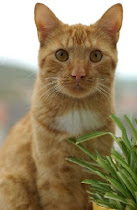Tips for Better Skin Healthby Dr. Sarah from Lifes Abundance October 2010 Newsletter
While underappreciated or even unrecognized as an organ, skin has amazing properties. For starters, it’s the largest organ of the body. Both tough and pliable, skin has many functions, including regulating body temperature, helping to prevent dehydration and protecting against injury and disease. Without skin, our cats couldn’t have hair, and everything that was on the inside would be exposed, making snuggle sessions a little on the icky side!
Canine and feline skin shares many similarities with human skin, but there are significant differences. They do have three layers of their skin, with the same nerves and blood vessels running throughout. Even though the pigmented skin in dogs contains melanin, dogs do not have the ability to tan like humans do. Also, they have apocrine glands (similar to human sweat glands), however, dogs do not sweat like we do. Instead, dogs have eccrine glands in their paws, which secrete a watery substance like sweat, although this typically only occurs when they are nervous and under stress. Now you know how it is that they can sometimes leave little damp paw prints when exiting the veterinary office!
As the body’s first line of defense to environmental factors, the skin is subjected to all sorts of insults and injuries. Critters of all stripes, from fleas to ticks to parasites (like mange mites) bite and damage the skin. Additionally, skin is under repeated assault by foreign objects, nibbling teeth, scratching claws and constant licking, all of which can weaken and impair the skin’s protective barrier. Skin can also be affected from the inside out by infections, hormonal imbalances, allergies and immune disorders.
Young pets are particularly suspectible to skin problems because their skin is more sensitive and their immune systems are not fully developed. Kittens, for example, are prone to ringworm (fungal) infections and puppies are predisposed to demodectic mange. If your puppy or kitten develops a rash, loses hair, or has bumps or warts, consult with your veterinarian to determine if treatment is necessary.
The bottom line is, healthy skin is a vital part of pet health, and its condition is a reflection of a pet’s overall well-being. Vulnerable to attacks on all sides, it’s very important that pet parents regularly monitor their pet’s skin health. Skin normally does its job well as the body’s protector, but sometimes even skin needs an extra boost. In this episode of Pet Talk, Dr. Sarah reviews some common causes of skin and coat problems in dogs and cats, and reveals some safe and natural home remedies that promote overall skin health.
For more information about the Lifes Abundance Pet Food that Dr. Sarah is talking about in the above video, please visit: Lifes Abundance Cat Food
###
Thursday, October 21, 2010
Healthy Skin Tips - It Starts from the Inside Out
Labels:
allegies,
dr. sarah,
skin health,
videos
Subscribe to:
Post Comments (Atom)

No comments:
Post a Comment